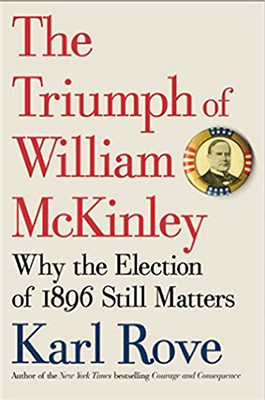 Michelle Newby is contributing editor at Lone Star Literary Life, reviewer for Foreword Reviews, freelance writer, member of the National Book Critics Circle, and blogger at www.TexasBookLover.com. Her reviews appear or are forthcoming in Pleiades Magazine, Rain Taxi, World Literature Today, South85 Journal, The Review Review, Concho River Review, Monkeybicycle, Mosaic Literary Magazine, Atticus Review, and The Collagist.
Michelle Newby is contributing editor at Lone Star Literary Life, reviewer for Foreword Reviews, freelance writer, member of the National Book Critics Circle, and blogger at www.TexasBookLover.com. Her reviews appear or are forthcoming in Pleiades Magazine, Rain Taxi, World Literature Today, South85 Journal, The Review Review, Concho River Review, Monkeybicycle, Mosaic Literary Magazine, Atticus Review, and The Collagist.
Lone Star Book Reviews
of Texas books appear weekly
at LoneStarLiterary.com
Karl Rove
The Triumph of William McKinley: Why the Election of 1896 Still Matters
Simon & Schuster
Hardcover, 978-1-4767-5295-2 (also available as an e-book, audio CD, and on Audible), 496 pgs., $32.50
November 24, 2015
So why does the election of a president more than one hundred years ago still matter today, you may well ask.
As it turns out, plenty. In an era when the nation was profoundly split between the South and the West, the North and the East, conflict between debtors and the financial class, sometimes fatal fights over how the economic pie should be allocated, and both parties employed procedure to gridlock Congress and caused the people to declare the whole place incompetent, McKinley circumvented the Republican party chiefs and “was the first president in more than two decades to win with a significant popular majority.” How did McKinley build a winning coalition out of these disparate interests?
The Triumph of William McKinley: Why the Election of 1896 Still Matters is Karl Rove’s lively, briskly paced, and meticulously organized answer to that question. But this book isn’t limited to the election; it is also a primer on American history, politics, and economics during the decades immediately following the Civil War. It compares and contrasts the politics of then and now and reminds us that history and politics are cyclical, and that there are patterns to be discerned and learned from, as is made evident in the modern campaigns of Nixon and Reagan. Perhaps someone should hide this book from Trump.
According to Rove, McKinley turned the system on its head and “ran the first modern presidential primary campaign.” Previously candidates had left the process to back room king-makers (“big dog Republicans”), rarely speaking publicly, but McKinley “began with an early, in-depth organization, structured, deliberate, and intense, run by men who were loyal to him.” McKinley’s strategy — “different as a modern factory was from a medieval workshop” — involved, for the first time, hand-picked audiences for the Front Porch, suggested talking points, and local color. Sound familiar?
Rove’s enthusiasm and appreciation for his subject results in an enjoyable reading experience, despite reams of facts, figures, and dates. This includes what is possibly the most easily understandable discussion of the usually esoteric realm of tariffs and currency that I’ve ever read. You don’t have to be a scholar to get it. The Byzantine machinations of convention politics and credentials challenges are rendered as comprehensible as is probably possible. The personalities of the major players — opponents and allies — are present on the page. Rove includes lighthearted leavening in descriptions of the conventions, where cocktails of bourbon, lemon juice, and sugar (called “the McKinley”) were sold, as well as canes “topped with a tin blob that resembled McKinley’s head.”
Rove concludes The Triumph of William McKinley with a look at why William Jennings Bryan lost the election, the three tasks that a campaign organization must complete, and an eight-point analysis of McKinley’s victory. It must be acknowledged, whether or not you agree with Rove’s politics, that he is one of the great political strategists of our time and an attentive, passionate student of history with command of massive amounts of data. He revels in the game and it shines through on every page of his book.
* * * * *

